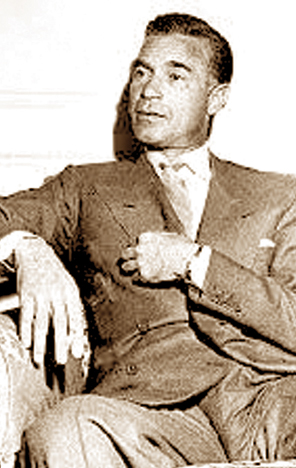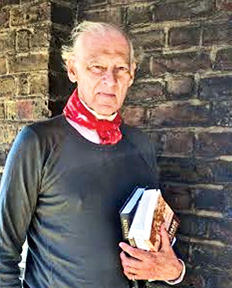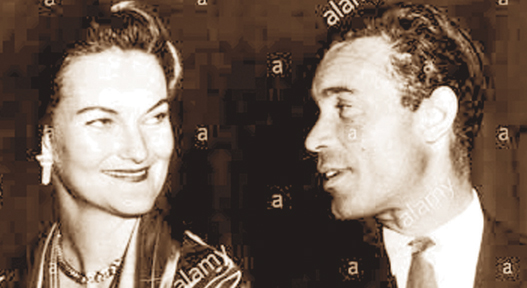|
Porfirio Rubirosa (1909 – 1965):
The Last Playboy
[PART I]
 Porfirio Rubirosa (Ariza) was born in the Dominican Republic, the
youngest child of an upper-middle-class family. His father, Don Pedro,
was the leader of a group of heavily armed men, working with the
government in the mountainous region of Cibae. In 1915 his father was
made Chief of the Dominican Embassy in Paris, which resulted in the
young Rubirosa spending his formative years there. He returned to the
Dominican Republic in 1926 but soon left his studies to join the
military. There he met Rafael Trujillo, the powerful dictator of the
Dominican Republic. Trujillo, impressed with the charm of the young
officer, made him a lieutenant of his Presidential Guard. Theirs was a
long relationship, often stormy, but enduring. He would marry the
President’s seventeen-year-old daughter in 1932 and become a diplomat of
the Dominican Republic four years later. Porfirio Rubirosa (Ariza) was born in the Dominican Republic, the
youngest child of an upper-middle-class family. His father, Don Pedro,
was the leader of a group of heavily armed men, working with the
government in the mountainous region of Cibae. In 1915 his father was
made Chief of the Dominican Embassy in Paris, which resulted in the
young Rubirosa spending his formative years there. He returned to the
Dominican Republic in 1926 but soon left his studies to join the
military. There he met Rafael Trujillo, the powerful dictator of the
Dominican Republic. Trujillo, impressed with the charm of the young
officer, made him a lieutenant of his Presidential Guard. Theirs was a
long relationship, often stormy, but enduring. He would marry the
President’s seventeen-year-old daughter in 1932 and become a diplomat of
the Dominican Republic four years later.
|

Porfirio Rubirosa |
Rubirosa’s divorce from the President’s daughter in 1938 seemed only
to have a temporary effect on Trujillo’s trust in him. By that time
Rubirosa’s notoriety at the bars, brothels and clubs was well known to
the President. Trujillo saw Rubirosa for what he was – an irresponsible
playboy but an incredible asset to a country that the rest of the world
barely recognised.
Duties
His duties at the embassies were mostly ceremonial and Trujillo kept
Porfirio busy with bizarre little requests to satisfy his comprehension
of the modern world and his nation’s place in it. The year 1937 was a
particularly frustrating time for the President when Haitian
encroachment on Dominican territory erupted in Trujillo’s decision
tovslaughter as many as 20,000 Haitians. It was the most brutal sort of
genocide after which a judgement against the Dominican Government forced
the country to pay $525,000 in damages to Haiti. While the President was
roiled by grisly events of his own making his son-in-law maintained his
badly-needed international diplomacy. He was a good man in a bad
situation. Nevertheless, as soon as he was divorced in 1938, Rubirosa
was expelled from the diplomatic corps. He held on to his diplomatic
passport but he was literally a man without a country. Flor Trujillo,
after divorcing Rubirosa, would go on to take another eight husbands.
Rubirosa however continued his Parisian life with bouts of drinking
and merrymaking that sometimes lasted nights and days. But he realised
that this existence needed funding as he no longer enjoyed legitimate
work as a diplomat and the substantial credit allowances he had enjoyed.
So he resorted to the familiar one of living off a woman – La Môme
Moineau – the chanteuse wife of a wealthy business man, Felix Benitez
Rexach– who had the fortune to share with her lover while her husband
was away in the Dominican Republic. He was a kept man and well known for
selling Moineau’s jewellery from time to time to raise cash.
Responsibilities
Now nearing thirty he was no longer the son-in-law of a powerful
dictator but a dashing Parisian with intriguing Dominican roots. Then,
surprisingly, he received word from Trujillo asking Rubirosa to play
host to the President’s wife and son who would be arriving in Paris in
the Spring of 1938. This was a job well suited to the out-of-favour
playboy and he carried out his responsibilities impeccably – in fact so
much so that when the dictator visited Paris on the heels of a United
States tour,vRubirosa again played the host to his former father-in-law,
who rewarded him by reinstating Rubirosa as a First Secretary at the
French and Belgian Embassies.
After the outbreak of war in 1939 a Dominican Embassy was established
in Vichy – not a favourite location for a Parisian playboy. But when he
was invited to a cocktail party in Paris he met the guest of honour – at
that time the most beautiful movie star in France – the 23-year-old
Danielle Darrieux. Their chemical attraction to each other was
immediate. The perfect gentleman, he drove her home after the party and
didn’t lay a hand on her. However, a few days later at L’Aiglon he met
her again – this timewith her much older husband – director Henri Decoin.
He witnessed a crumbling marriage.
|

Sir Christopher Ondaatje (OC, CBE) |
Of course Rubirosa was suspected of latching on to Danielle Darrieux
to put some sort of an anchor on his independence. She was gorgeous,
spry, famous and had her own money. She was a real celebrity and after
attaining her divorce from Decoin, the attractive couple married in the
collaborational capital of Vichy – something they had to do in the
war-torn Nazi-dominated country, which did not really offer a safe haven
for the dusky Dominican and the gorgeous young star. They honeymooned in
Portugal, spent some time in a chalet at the foot of Mont Blanc, and
eventually wound up on a small farm that she owned thirty miles east of
Paris. Here they lived a peasant life through most of 1943 until Paris
was liberated by the Allies.
Their glamorous marriage lasted until January 1945 when Rubirosa was
appointed Chargé d’affaires to the Dominican Embassy in Rome where, in
an extraordinary and unlikely meeting, Rubirosa met an American
journalist – typical enough, except that she was lauded as the richest
woman in the world. Her name was Doris Duke. Years later Rubirosa would
say about his marriage to Danielle Darrieux “It was a very big love, and
we had said from the beginning that the moment it stops being such a big
love we will separate. We will not ruin this thing. So we separated.”
It seemed as if Porfirio Rubirosa had been waiting for the tobacco
heiress Doris Duke all his life. When the rangy once divorced
correspondent for the International News Service telephoned Danielle
Darrieux for an interview the stage was set for another conquest and
another notch on the belt of the infamous philanderer. “It’s impossible
for me to work,” Rubirosa is quoted as saying. “I just don’t have the
time.” It was an accurate assessment. Being the diplomatic employee of
the Dominican dictator and juggling his duties with his expensive night
life and attention to women, he was the most famous playboy of the
post-war period, rivalled only by Prince Aly Khan. He had the most
perfect manners of anyone when it came to women, and could wrap his
charm around them like a Russian sable coat. He also had a good memory
and when he spoke to you, man or woman, it seemed as if the rest of the
world had lost interest for him.
He was an international legend but charm could only take a man so
far. So what was his secret?
There is no other way of saying it except that he was exceptionally
well-endowed. Women heard about his skill in the bedroom, wondered about
it and whispered about it. The stories were legion. When he married Flor
de Oro Trujillo he was a nobody. When he married Danielle Darrieux he
was a mystery man. But when he began his relationship with Doris Duke,
he became front page news. He became famous just as the celebrity era
was blooming – and the genius of his celebrity was that the reason for
it could not be spoken of in polite society.
Courtship
Rubirosa’s courtship of Doris Duke was both brisk and peripatetic.
They were together in Paris, Rome and the French Riviera. Rubirosa saw
to the dissolution of his marriage to Danielle Darrieux while in Paris
in March 1947 and Doris Duke was there working at her so-called
journalist job. Rubirosa cunningly arranged for their marriage to be on
Dominican soil which, following the Napoleonic Code of Law, gave him
authority over communal property. Thus Rubirosa would have control of
hundreds of millions. However the State Department had different ideas
and before they finally married in New York he was forced to sign a
pre-nuptial agreement where he would renounce all claims to Doris Duke’s
fortune in exchange for cash and certain gifts. He signed – no doubt
thinking that he would get his hands on the fortune some time later in
the marriage. It didn’t work out that way. The relationship was
strained, and when it collapsed after fourteen months Rubirosa was
given, as a final settlement, a house on the Rue de Bellechasse in Paris
and a promise of $25,000 a year in alimony until he remarried. Doris
Duke had a house in Reno, Nevada, so the divorce only took a matter of
minutes. After the break-up he was quoted as saying, “She was gay,
elegant, charming – and rich. I had everything a man could desire. But,
in the end, other women began to attract me again.”
|

Doris duke and husband Porfirio Rubirosa |
In 1948 Rubirosa was appointed as an ambassador in Argentina – a
country he had chosen because of his latest passion – polo. There an
aspect of Rubirosa was witnessed where a reporter looked on as he
engaged in a wild folk spectacle called ‘Pato’, a primitive variation on
polo in which players mounted on horses with neither saddle nor stirrups
chased a live duck, or ‘parts’ of it, with their hands. The game was
strictly against the law but the amazed observer was quoted as saying,
“This man, so polite and charming in daily life, was transformed into a
savage covered in blood, willing to risk his life so as not to submit to
defeat.”
Motor sports
Late in 1948 Trujillo switched Rubirosa’s diplomatic position to Rome
where he indulged in his passion for motor sports and for the next
fifteen years he would own at least half a dozen Ferraris – machines
tuned for high performance. He raced in Le Mans in 1950 and again in
1953. He also gadded in Paris, Deauville, Palm Beach, Ciudad Trujillo in
the Dominican Republic, and Argentina – an expensive life financed in
part from his settlement from Doris Duke, but also by his dictator
employer who was renowned for giving Rubirosa money whenever he needed
it. “He’s good at his job,” Trujillo bluntly explained.
He became involved with ZsaZsa Gabor and for a while they were
inseparable. The relationship was stormy and very high profile. Rubirosa
had failed to hold on to Doris Duke – one of the richest women in the
world, but there was another woman out there with an even larger fortune
and, when Rubirosa bumped into her in Deauville in the summer of 1953,
he set his sights on attaching himself to that fortune – at the time
estimated to be in excess of $28 million – all coming from the Woolworth
stores – a massive legacy built on the nickels and dimes of consumers
all over North America and Western Europe. She had a chequered marital
history and was, when Rubirosa met her, the Princess Barbara Hutton
Mdivani Haugwitz Reventlow Grant Troubetzkoy, a serial bride with four
husbands in her wake by the time she was forty years old, constantly
sick, with surgeries for mysterious ailments, and addicted to booze and
pills. None of this bothered Rubirosa – who pursued her throughout the
summer in France and then in New York. His turbulent affair with Zsa Zsa
Gabor was still very much part of his life – even though she was still
married to the actor George Sanders. He fled from her in Las Vegas
before she called a press conference announcing that the violent
Rubirosa had struck her, blackening one of her eyes. She even commented
on Barbara Hutton: “For a rich woman he’s the very best pastime she
could have.”
Part ll next week.
|

